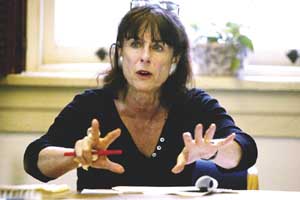2002 Quantrell Award Winner: Jean Comaroff, Bernard and Ellen C. Sunny Distinguished Service Professor in Anthropology and the College
By Josh SchonwaldNews Office
 Jean Comaroff |
But Comaroff, who also won a Quantrell Award for Excellence in Undergraduate Teaching in 1984, relishes the opportunity to teach such students. “I regard undergraduate teaching as a form of social activism,” she explained. “Before they go off to their careers in business, politics, social work, medicine, I have a chance to give these students a critical view of the Western world.”
Comaroff, who teaches African Civilization in the Core, feels it is important to de-center American students. “So many Americans regard the United States as the undisputed center of the world.” Moreover, she adds, “we live in an increasingly interconnected universe; it’s more important than ever before to get students to see the world from other cultural perspectives.
“My goal, and the goal of anthropology, is to get students to question their views of what is natural, what is taken for granted,” she said. She uses materials as tools to challenge student’s assumptions. Comaroff, a native of South Africa who has done extensive fieldwork in that country, has specifically focused on the religion of the southern Tswana peoples and the liberation struggles of southern Africans more generally. She believes an understanding of African societies is especially effective in challenging Eurocentric assumptions because the continent plays a uniquely stereotyped role in the global imagination, as a place of human origins and enduring apocalypse.
Like her husband, John, she regards her involvement in a visit to Cape Town, South Africa, in 2001, the first year South Africa was offered as a study abroad option in the African Civilization program, as among the most rewarding teaching experiences of her career. “It was unusually challenging,” said Comaroff, of the three-month program. “It was more like a 10-week retreat or encounter group. We got to know the students in a very intense way.”
And direct experience with local realities became an effective teaching tool for Comaroff. Students read texts on theories of colonialism, economic development and globalization, and then, they would encounter living evidence of these processes in the world outside the classroom. They saw visible traces of the late apartheid system, forms of modernity different from their own and great contrasts between poverty and affluence. Often these experiences were disturbing: “They’d get solicited on the street by young people without work or by mobs of street children,” she said.
“These experiences brought the texts we were reading to life and encouraged animated dialogue and discussion. We’d try to get them to understand the larger social and economic processes that had given rise to the presence of the street children here and by extension elsewhere,” said Comaroff. The students had an especially intense relation with the texts because they felt challenged to bring them into relation with the new world they were confronting on a daily basis.
“In class in Chicago, I always try to evoke such graphic realities,” said Comaroff, “but there is nothing quite like that direct encounter.”
![[Chronicle]](/images/small-header.gif)